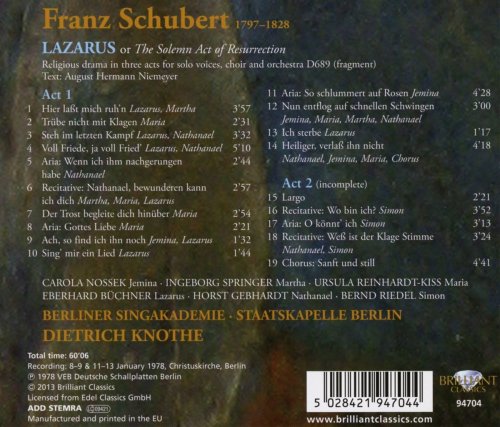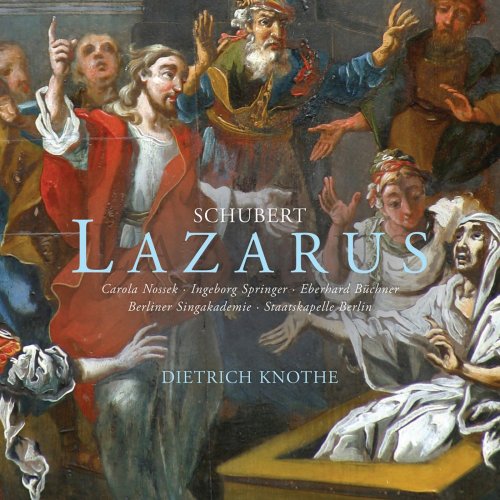
Staatskapelle Berlin, Dietrich Knothe, Eberhard Büchner -
BAND/ARTIST: Staatskapelle Berlin, Dietrich Knothe, Eberhard Büchner
- Title: Schubert: Lazarus, D. 689
- Year Of Release: 2013
- Label: Brilliant Classics
- Genre: Classical
- Quality: flac lossless (tracks)
- Total Time: 01:00:07
- Total Size: 255 mb
- WebSite: Album Preview
Tracklist
01. Lazarus, D. 689, Act 1: "Hier laßt mich ruh'n" (Lazarus, Martha)
02. Lazarus, D. 689, Act 1: "Trübe nicht mit Klagen" (Maria)
03. Lazarus, D. 689, Act 1: "Steh im letzten Kampf" (Lazarus, Nathanael)
04. Lazarus, D. 689, Act 1: "Voll Friede, ja voll Fried'" (Lazarus, Nathanael)
05. Lazarus, D. 689, Act 1: Aria "Wenn ich ihm nachgerungen habe" (Nathanael)
06. Lazarus, D. 689, Act 1: Recitative "Nathanael, bewunderen kann ich dich" (Martha, Maria, Lazarus)
07. Lazarus, D. 689, Act 1: "Der Trost begleite dich hinüber" (Maria)
08. Lazarus, D. 689, Act 1: Aria "Gottes Liebe" (Maria)
09. Lazarus, D. 689, Act 1: "Ach, so find ich ihn noch" (Jemina, Lazarus)
10. Lazarus, D. 689, Act 1: "Sing' mir ein Lied" (Lazarus)
11. Lazarus, D. 689, Act 1: Aria "So schlummert auf Rosen" (Jemina)
12. Lazarus, D. 689, Act 1: "Nun entflog auf schnellen Schwingen" (Jemina, Maria, Martha, Nathanael)
13. Lazarus, D. 689, Act 1: "Ich sterbe" (Lazarus)
14. Lazarus, D. 689, Act 1: "Heiliger, verlaß ihn nicht" (Nathanael, Jemina, Maria, Chorus)
15. Lazarus, D. 689, Act 2: Largo
16. Lazarus, D. 689, Act 2: Recitative "Wo bin ich?" (Simon)
17. Lazarus, D. 689, Act 2: Aria "O könnt' ich" (Simon)
18. Lazarus, D. 689, Act 2: Recitative "Weß ist der Klage Stimme" (Nathanael, Simon)
19. Lazarus, D. 689, Act 2: Chorus "Sanft und still"

As with many of the works composed during the same period, Schuberts Lazarus essentially a sacred stage work rather than an oratorio remains unfinished, with Act 2s burial never completed and the music for Act 3s resurrection never begun. Perhaps Schubert felt unable to continue due to his religious views; perhaps his rapidly developing style simply caused him to lose patience with the work, which it would appear was not written to commission. Whatever the reason, there is little doubt that the work remains one of the composers most forwardthinking and innovative and therein lies the real miracle of the piece. In terms of musical profundity and individuality, Lazarus may be thought of as the dramatic vocal counterpart of the Unfinished Symphony. What makes the work stand out is its formal and instrumentationbased novelties gone is the separation of recitative and aria still adhered to by Beethoven, for example as well as an unprecedented treatment of the text Jairuss daughters description of her death and return to earthly life, for instance, surpasses anything in Schuberts songs with regard to expression of words in music.
Written during the political setbacks of the Restoration, Lazarus represents Schuberts first attempt to escape from a world that becoming increasingly out of joint. The composer, like so many of his fellow artists, sought refuge in Romantic forms of religious utopianism, and this quality also comes to the fore in Unfinished and his A flat major Mass, works that also date from the middle period of Schuberts life. It is an astonishing paradox that Schubert, whose operas failed so completely, should emerge in this unfinished work as the unnoticed pioneer of music drama.
Considered years ahead of its time, Lazarus is here performed by an allGerman cast featuring the esteemed choral conductor Dietrich Knothe who made a name for himself recording unknown or forgotten music of the great Romantics.
01. Lazarus, D. 689, Act 1: "Hier laßt mich ruh'n" (Lazarus, Martha)
02. Lazarus, D. 689, Act 1: "Trübe nicht mit Klagen" (Maria)
03. Lazarus, D. 689, Act 1: "Steh im letzten Kampf" (Lazarus, Nathanael)
04. Lazarus, D. 689, Act 1: "Voll Friede, ja voll Fried'" (Lazarus, Nathanael)
05. Lazarus, D. 689, Act 1: Aria "Wenn ich ihm nachgerungen habe" (Nathanael)
06. Lazarus, D. 689, Act 1: Recitative "Nathanael, bewunderen kann ich dich" (Martha, Maria, Lazarus)
07. Lazarus, D. 689, Act 1: "Der Trost begleite dich hinüber" (Maria)
08. Lazarus, D. 689, Act 1: Aria "Gottes Liebe" (Maria)
09. Lazarus, D. 689, Act 1: "Ach, so find ich ihn noch" (Jemina, Lazarus)
10. Lazarus, D. 689, Act 1: "Sing' mir ein Lied" (Lazarus)
11. Lazarus, D. 689, Act 1: Aria "So schlummert auf Rosen" (Jemina)
12. Lazarus, D. 689, Act 1: "Nun entflog auf schnellen Schwingen" (Jemina, Maria, Martha, Nathanael)
13. Lazarus, D. 689, Act 1: "Ich sterbe" (Lazarus)
14. Lazarus, D. 689, Act 1: "Heiliger, verlaß ihn nicht" (Nathanael, Jemina, Maria, Chorus)
15. Lazarus, D. 689, Act 2: Largo
16. Lazarus, D. 689, Act 2: Recitative "Wo bin ich?" (Simon)
17. Lazarus, D. 689, Act 2: Aria "O könnt' ich" (Simon)
18. Lazarus, D. 689, Act 2: Recitative "Weß ist der Klage Stimme" (Nathanael, Simon)
19. Lazarus, D. 689, Act 2: Chorus "Sanft und still"

As with many of the works composed during the same period, Schuberts Lazarus essentially a sacred stage work rather than an oratorio remains unfinished, with Act 2s burial never completed and the music for Act 3s resurrection never begun. Perhaps Schubert felt unable to continue due to his religious views; perhaps his rapidly developing style simply caused him to lose patience with the work, which it would appear was not written to commission. Whatever the reason, there is little doubt that the work remains one of the composers most forwardthinking and innovative and therein lies the real miracle of the piece. In terms of musical profundity and individuality, Lazarus may be thought of as the dramatic vocal counterpart of the Unfinished Symphony. What makes the work stand out is its formal and instrumentationbased novelties gone is the separation of recitative and aria still adhered to by Beethoven, for example as well as an unprecedented treatment of the text Jairuss daughters description of her death and return to earthly life, for instance, surpasses anything in Schuberts songs with regard to expression of words in music.
Written during the political setbacks of the Restoration, Lazarus represents Schuberts first attempt to escape from a world that becoming increasingly out of joint. The composer, like so many of his fellow artists, sought refuge in Romantic forms of religious utopianism, and this quality also comes to the fore in Unfinished and his A flat major Mass, works that also date from the middle period of Schuberts life. It is an astonishing paradox that Schubert, whose operas failed so completely, should emerge in this unfinished work as the unnoticed pioneer of music drama.
Considered years ahead of its time, Lazarus is here performed by an allGerman cast featuring the esteemed choral conductor Dietrich Knothe who made a name for himself recording unknown or forgotten music of the great Romantics.
As a ISRA.CLOUD's PREMIUM member you will have the following benefits:
- Unlimited high speed downloads
- Download directly without waiting time
- Unlimited parallel downloads
- Support for download accelerators
- No advertising
- Resume broken downloads


